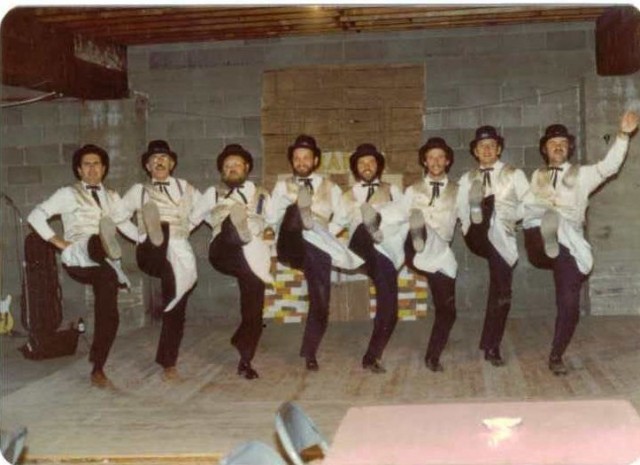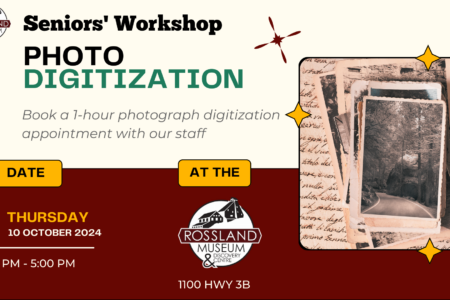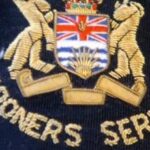Doing the can can in a can-do town: The legend of the Dancing Waiters
What do you get when you cross a civic celebration with an aging old theatre, a beer garden, and a party featuring dancing girls–when no girls show up? Well you’ve got yourself a piece of local history that displays in numerous ways the character of Rossland and Golden City Days.
Sure, Rossland is known far and wide for our Boomtown Garter Girls in their unofficial role as Rossland’s ambassadors to the world, but the story behind their lesser known (particularly if you’ve moved to town in the last 12 years) male fore-fathers in the Rossland can-can scene is one well worth telling.
Rossland, as we all know, is a place where people are happy to offer up their time, brainpower, and muscles to chip in, volunteer, and generally do what they can to make our town a better place. This is where the story of the dancing waiters begins.
In 1972, during Rossland’s 75th anniversary celebrations, a number of guys (headed up by Jim and Alfie Albo and Vince and Bill Profili) wanted to contribute to Golden City days. The first thought was to run a beer garden. At that time, Jim spoke up and suggested that, “instead of a beer garden we should run an old time saloon!”
At that time, the old Capitol Theatre building that stood in the now-vacant lot next to the Thrift Store on Washington was vacant. A developer had purchased it in the hopes of converting it to apartments and got so far as to gut the building, leaving only the shell standing. The place had the makings of a fine saloon written all over it. Saw dust was poured over the floor, a friend of a friend put in some lighting, and Jim started pulling together the entertainment.
“I had been down with a pipe band I played with in Republic, Washington. They had an old, so-called saloon in the bottom of a building there with can-can girls so I said, ‘let’s do that up here! I know these people; maybe they‘ll come up to dance for us’.
The girls said ‘yes’ and everything was set for the weekend festivities. With the Fireman’s Ball on the Friday night, the guys didn’t want to compete so they planned to open the saloon mid-day Saturday.
That Friday night, the fateful call that set history in motion was made. All of the girls from Republic were sick except for one, and they called to say they wouldn’t be able to dance at the saloon.
In addition to providing ready volunteers, Rossland’s character also has a bit of ingenuity in it and a real sense of “The show must go on,” regardless of how things might turn against it.
“We had advertised that we were going to have dancing can-can girls so we had some trouble on our hands. I went to the guys the next morning and said, ‘look guys, here’s the situation. We’ve got an event in a couple hours and we don’t have any girls’”.
Failure was not an option, and Jim remembered that back in grade 13 (which was 13 years prior to the year we’re talking about) he had learned to do the can-can for a Valentine’s Day skit at school.
“I figured I still remembered how to do that dance, so I tried to teach the guys in the hour just before we opened the saloon. So I took a couple of my cousins and a few guys that volunteered to do it with me.
“We got up on stage and told the crowd that ‘We don’t have the dancing girls but that we still had entertainment’. So we got up on the stage and went through the dance. The guys only had about three times to try it before we went on stage and it takes some time to get on to it. The crowd really appreciated that we were doing this so they whooped and hollered and really loved it. We got asked for an encore!”
Year one of the saloon was pulled off to rave reviews!
Building on their performance from the year before, Jim got the guys together next spring and “taught them how to do the dance a little better this time with some more practice.”
As Golden City Days 1973 neared, the can-can girls from Republic were asked again to come up and perform at the saloon. This time they made it unscathed. The old Capitol was packed to the brim with folks for year two, all of them raring for a party of epic proportions.
“It was a full house with 400 people in that old theatre,” remembered Albo. “The girls got up. I introduced them and they did their dance. After they finished all of the people started hollering and chanting that they wanted the dancing waiters to come back. A bit reluctantly, we got up there. Unbeknownst to the audience, we had been practicing. When they saw us they were on their feet hollering and screaming for encores and that really set it off and we kept it up every year for 25 years until Rossland’s 100th birthday. That’s when we stopped dancing as most of us were getting up there in age with sore knees and hips by that time. That was it. After 25 years, we said it was time to rest.”
Of course, it wasn’t all smooth sailing along the way. Year three of the saloon, for example, was not without its challenges.
In the winter of 1973-4, the owner of the theatre building decided he’d save a few bucks by not heating the building. Low and behold, the snow built up and up on the roof and ultimately the old building collapsed. Suddenly, the guys were in need of a new location and the next summer they moved the saloon into the old co-op building where the Nelson District Credit Union now stands. In that location the show went on through Rossland’s Centennial in 1997 when the dancing waiters called it a day.
“We talked a few times recently about bringing back the saloon but with all of the insurance claims and things going on these days you could never operate the way we used to operate it,” added Albo.
It would seem that the Wild West spirit that the saloon paid tribute to hadn’t fully disappeared from town.
“We had a fantastic following. Every year the shows sold out in minutes. We didn’t put up with any hassles then, you see. We couldn’t. Everyone was there to enjoy themselves so if you got out of line, you got thrown out and sometimes being thrown out was not particularly painless [laughs] but it kept everyone in line and the police appreciated it and maybe that’s why they let us run for so long.”
Another facet to the Rossland character is one of generosity. We here in the Mountain Kingdom are all too happy to donate to a worthy cause, help a friend in need and make sure everyone has a good time in the process.
For 25 years, the Dancing Waiters ran their saloon as a fundraiser for worthy causes. Following a wise investment strategy, the waiters deposited all of the money earned into their fund each year and only used the interest it generated each year to donate to various causes they deemed worthwhile. The waiters were the first group to donate to the Golden City Manor project, helped with the solarium construction at Mater Misercordae Hospital, paid for medical bills of Rosslanders in need, supported the Salvation Army’s Christmas hamper fund and various other needs in town that popped up from year to year. Over the years no less than $100,000 was donated back to the community.
While the dancing may have stopped 12 years ago, the legacy of the dancing waiters remains strong as the money accumulated over the years still sits soundly in the Credit Union on the site of their final performance. The interest from that account still gets donated each year to worthy recipients. And thus ends the story of the dancing waiters.
Volunteers that made the City that much more fun that were willing to chip in and get creative when necessary to keep the show going and then turned that fun into a way to give back to those in need; such was the dancing waiters and so is the spirit and character of Rossland.

























